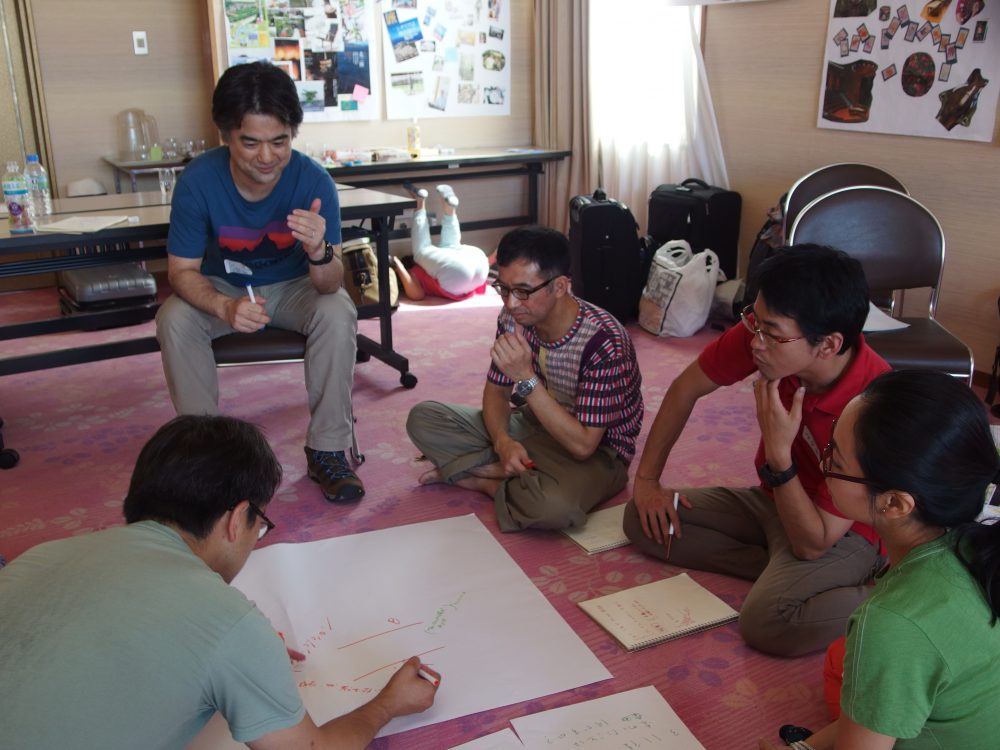Interview series with WIT Accelerators – Here is the latter half of the interview with Mr. Keitaro Fujishima, WIT Senior Accelerator.
Please visit here for the first half of the interview.
Interviewer and article: Mio Yamamoto
Recorder: Risa Komatsu, WIT intern
Translater: Maho Harada, WIT pro bono
6. Learning firsthand from un’s in the society
You mentioned in the WIT 2016 Impact Report that you are learning firsthand from un’s in the society. Could you explain what you mean by that?
Excerpts from the Impact Report
“Mr. Hashimoto is dedicated to solve the caring issue, which is one of the critical problems in the aging society Japan. Through discussing “What should we do to grow Replus?“ I learned what is NOT going on (“un’s”) in our society, as well as it motivated me to create social impact by my own business. As a result of our collaborations, we are planning to develop a course in our Recruit Management School to transfer Replus’s knowledge and experience to business persons. I hope this opportunity will help decrease employees’ retirement due to caring.” –Keitaro Fujishima
At Recruit, we talk about the “un’s.” The “un” in “un-satisfied,” or “un-trusting.” Our business is about resolving situations that are unfulfilled. We want to be the leader for resolving the “un’s” in society. An “un” is not necessarily negative. We want to create a society where people can live cheerfully. In order for people to live cheerfully, there are “un’s” that need to be resolved. Our role is to resolve those “un’s.”
We can start by realistically capturing the “un’s” that each person is facing. By realistically feeling those “un’s,” we convert them into an energy of resolution. People in the social sector also start with the same motivation. So that’s something we can both share and learn from.
Today, new business development is not what it used to be. You can’t make $100 million by just targeting untapped market from a distance. People who’ve really explored an “un” are able to provide unique services. Just like when Airbnb and Uber first appeared, no one understood what they were about.
7. What is your honest impression of WIT?
Including last year’s Cross-Border Learning Journey, I’m very impressed with how WIT acts as a platform for such a diverse group of people to come together. The majority of WIT Accelerators are from the business sector, but there’s so much potential for them to connect to people from the social sector. There’s also a lot of potential for connections to occur between people from the social sector, as well as between people from the business sector. This infinite possibility of combinations is what makes WIT attractive, and the accidental happenings are also fun. For example, Mr. Ohashi from Asuiku (WIT Entrepreneur) is going to start an organization to grow young leaders in the educational field, and I think it would be interesting to help in some way.
In order to expand this platform on a sustainable basis, I’m worried how WIT is going to increase its profit. From my point of view, WIT is a “really nice person” who says, “it’s OK, I don’t need to be paid.” (Laughs) I think it should be on equal ground for the value it provides, to be compensated on an equal basis for the value it provides. As a professional, if I receive something, I should give back the same value and pay for the value equivalent to what I receive.
8. In your case, what aspect of WIT are you paying for?
I’m paying for accidental encounters with a diverse range of people, for the connections I make with people, and for the stimulation I get from these connections. Although I try my best to be active, my time is limited. There’s a limit to the number of people I can connect with, given what I can do as one individual. In my current position, I manage about 130 people. I feel that I can make a direct difference in the long term, but it’s difficult to feel that on an immediate level. So WIT gives me the opportunity to feel like I’m able to make a direct difference.
9. Tell us how you became a Board of Directors for Replus after mentoring them for about a year.
Daigo (Executive Director of Replus) asked me to join the Board. He was suddenly very formal and asked for a meeting in Tokyo. (Laughs) When we met, he told me that he wanted me to be more involved (with Replus.) Especially in regards to leadership and organization development, he wanted me to share my knowledge with the other members. That’s something I thought I could do, so I accepted his request to join the Board.
— Tell us about your involvement with Replus as a Board member.
I participate in quarterly Board meetings. I also do coaching sessions on Skype for Daigo once a month. And sometimes, they ask me questions on an individual basis, like “What do you think about this?” or “We’re going to sign a contract with this company. Is there anything we should be careful about?”
I meet with the Board in person every 6 months, where we hold a Board meeting for a half to full day. The rest of the time, I participate on Skype. When I meet them in person, I listen to their problems, which I help resolve. So far, I attended two of the board meetings in person. The first time, we held a workshop for the management to discuss Replus’ principles, mission and values. The second time, we discussed the organizational structure and how to develop human resources. We wrote out ideas about how we could resolve the issues on a white board. I often do this at work as a consultant, so it wasn’t that different. (Laughs)
— How has it been, going from being a mentor to a Board member?
I feel more responsibility compared to before. But my resources are limited and I can’t be hands-on about everything, so I have to decide where I can support them, and where I should leave it up to them. I’m careful about not interfering with the details. I don’t have as many facts as they do about their business, so I’m conscious about not stepping in too far. It’s the same being a consultant – I always say, “From an outside perspective, this is what I see.”
10. What do you aspire to do in the future? (Directly through WIT, or indirectly)
I’m not concerned whether it’s with WIT or RMS, but I think about how I can realize the content of that diagram I showed earlier.
— What’s important in order to realize that diagram?
On a very basic level, it’s important for me to expand the places I connect with, to establish connections with many different places. If I don’t increase these connections, the number of opportunities for accidental innovations won’t increase. Steve Jobs used to talk about “connecting dots.” I think things will connect as I go along. I’m not in a rush. I think that continuing these kinds of activities will help realize that diagram as a result.
11. Do you have a message for business people who will join WIT in the future?
If you enjoy meeting a diverse range of people and the accidental things that are born as a result, if that gives you the sense of expansion as a person, I think it would be good for you to join. Does that sound like an ad? (Laughs) By enjoying these things, your inspiration will expand and new things will be born.
I think I’m a different person from who I was when I joined two years ago. When I took on this position, I limited myself to the role I was given. I thought about fulfilling my role, but now I’m more free.
From interviewer…
Hope you enjoyed the articles. I personally was very resonated with interaction with others and society “gives you the sense of expansion as a person.” Stay tuned to our next Accelerator interview!
Thank you very much Fujishima san for being interviewd, Risa for recording, and Maho for translation.

